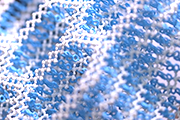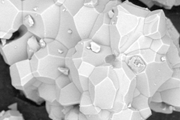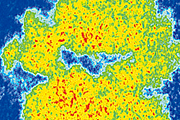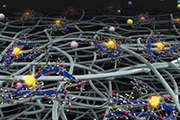Elucidation of Proton Conduction Mechanisms in COFs Using Machine-learning Molecular Dynamics
A study conducted by Saori Minami et al., in collaboration with DENSO CORPORATION was published in the Chemistry of Materials.
We present a factor dominating the proton conduction in covalent organic frameworks (COFs), which are attracting attention as a proton-conducting material for fuel cells. COFs are expected to demonstrate excellent proton conductivity due to the formation of proton transport path with low tortuosity. However, reported conductivities vary significantly, and it is difficult to experimentally evaluate the factor that dominates proton conductivity.
For elucidations, we conduct molecular dynamics simulations using machine-learned force fields with varying the water content, the number of sulfonic acid groups, and their side chain lengths. The proton diffusivity spanned over an order of magnitude depending on the three variables; the proton diffusivity increases with higher water content, lower sulfonic acid concentration and shorter side chain length. The detailed analysis on distributions of water and sulfonic acid groups in the pore reveals that the diffusivity is controlled by the local water uptake around sulfonic acid groups.
Title: Impact of Local Water Uptake on Proton Conduction in Covalent Organic Framework Revealed by Machine-learning Potentials
Authors: Minami, S., Kin, M., Takahashi, K., Sato, T., Jinnouchi, R.
Journal Name: Chemistry of Materials
Published: October 1, 2024
https://doi.org/10.1021/acs.chemmater.4c01351


































